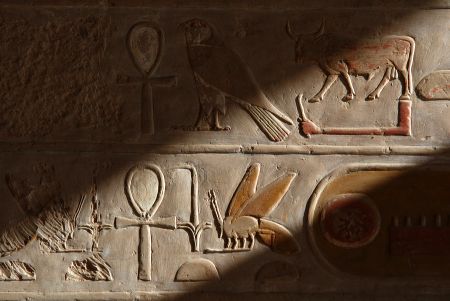
Nameless and shameless, that’s our Bad Girl of the week. Scripture doesn’t tell us her age, her physical description, or her background. We know only that she was married, she was Egyptian, and she was definitely Bad to the Bone.

Chapter 2: Bored to Distraction
Genesis 39:1-23
In Pharaoh’s court, Potiphar served as “commander of the royal guard” (CEB), but behind his back, people called him the “chief butcher” (EXB). You know this executioner wouldn’t hesitate to lop off the head of any man who tried to play patty cake with his wife.
Enter Joseph, a handsome young Israelite, despised by his brothers. They “sold him for twenty shekels of silver to the Ishmaelites” (Genesis 37:28), who in turn sold him to Potiphar, no doubt for a tidy profit.
His brothers treated Joseph like dirt. His new owner considered Joseph mere property. But God had a bigger, better plan. “The Lord was with Joseph so that he prospered” (Genesis 39:2).
Joseph didn’t prosper because he was good, but because God is good and chose to bless this young man no matter where he landed—in a ditch by the side of the road or in a wealthy Egyptian household.

Even Potiphar noticed that the Lord gave Joseph “success in everything he did” (Genesis 39:3). Wow. For Potiphar to give God credit, Joseph must have honored God first, praising the Lord every chance he had.
The Holy Spirit is nudging me, even as I type those words. Go and do likewise, Liz. When blessings come, we’re to lift up God and not ourselves, glorify his name and not our own, spread his fame, rather than seek it for ourselves.
Potiphar put Joseph in charge of everything he owned, inside and out, and the Lord blessed it all. The only thing Potiphar had to worry about was “the food he ate” (Genesis 39:6). Falafel, anyone?

Meanwhile, Mrs. Potiphar had an appetite of her own. And look who came along to satisfy it: Joseph, that “well-built and handsome” Hebrew slave. He was definitely “attractive” (AMP), assuredly “strong and good-looking (NLV), and right there under her roof.
Naturally, she “took notice of Joseph” (Genesis 39:7). Who wouldn’t? Like Eve gazing at that forbidden fruit, Mrs. P eyed her household’s delicious newcomer.
Later Jewish commentaries give her the name Zuleika, which means “fair, brilliant, and lovely” in Arabic. Was she beautiful? We can’t be sure, but clearly she thought she had something to offer. Her suggestion to Joseph cut right to the chase: “Come to bed with me!” (Genesis 39:7).
Hard as it is to confess, in my Former Bad Girl days—a few details here—I was every bit as brazen as Potiphar’s wife, propositioning men whenever and wherever the urge struck.
No, I’m not kidding. And no, I’m not proud of it.
What I am is grateful. Grateful for a God who gently washed those words out of my mouth with the finest soap imaginable, then scrubbed away my sins with his love, his mercy, and his grace.
Thank you, thank you, thank you, Lord. Thirty years and counting, and I still can’t say it enough. Thank you.

As for Joseph, did he take advantage of Mrs. Potiphar’s salacious offer? He did not. Instead, he told her, “How then could I do such a wicked thing and sin against God?” (Genesis 39:9). Joseph didn’t call her wicked; he called adultery wicked. And he made it clear Who would be dishonored if he said yes. Good lessons there.
Even with Joseph’s strong witness, Mrs. P didn’t give up. She “spoke to Joseph day after day” (Genesis 39:10), until he refused “even to go near her” (CEV).
Have you ever wanted something as badly as this desperate Egyptian housewife did? It’s easy to judge her through the lens of time—and hard to admit we may have something in common with her. Blind ambition. Unquenchable desire. A driving sort of need that refuses to be ignored.
Mrs. P waited until an opportune moment when the house was empty, then made her move. This is the one verse we’ll unpack.
She caught him by his cloak and said, “Come to bed with me!” But he left his cloak in her hand and ran out of the house. Genesis 39:12

She caught him… Genesis 39:12
As much as Joseph tried to speak no evil, see no evil, hear no evil, Potiphar’s wife would not be denied. She “grabbed” (CEB) and she “took” (WYC). In Hebrew, taphas means “to lay hold of, to seize,” with a secondary meaning of “to grasp in order to wield,” like one might grip a sword and use it as a weapon.
Was she trying to control Joseph? Prove who was mistress and who was slave? Or was Potiphar’s wife merely determined not to let him slip through her hands yet again?
When we don’t get what we want, the temptation to reach out and snatch may seem too great to resist.
Resist, beloved. God brings us what we need, not what we want.
…by his cloak… Genesis 39:12
The Hebrew word, beged, simply means “apparel,” used for everything from the rags of a pauper to the robes of a priest. Egyptian slaves wore only the most basic linen clothing. Whether you call it his “robe” (CJB), his “outer garment” (NET), his “coat” (CEV), or simply his “clothes” (GW), Mrs. P grabbed a handful.
She wanted the man, not his threads. But she settled for less, then hoped for more.

…and said, “Come to bed with me!” Genesis 39:12\
Second verse, same as the first. This is exactly what she told Joseph earlier. We see nothing creative here, not even an attempt to woo him with her charms or flatter him with compliments.
Instead, her demands are quite explicit. “Lie down with me” (CEB). “Make love to me!” (CEV). “Have sex with me!” (NET). In Hebrew, it’s a single word, shakab, meaning “lie.”
However brief the message, Joseph got it. And quickly got out.
But he left his cloak in her hand… Genesis 39:12
Further proof of Joseph’s swift departure. She was still “hanging onto his coat” (CEV) when he “tore himself away” (TLB), “leaving her holding his clothes in her hand” (VOICE).
How much of his clothing was left behind is debatable, though what matters is he left it. Had I been Joseph, I would have gotten into a tug of war, trying to save my clothing, leaving myself vulnerable to temptation.
Joseph was smarter than that. He didn’t just leave the room; he left the building.

…and ran out of the house. Genesis 39:12
This Egyptian home on the banks of the Nile may help us imagine Joseph as he “escaped and ran outside” (GNT). Now what? The poor guy was always losing his clothes. First when his brothers stole his coat of many colors, and again when Mrs. P snatched his robe.
But Joseph was still fully dressed in what mattered most: “For he has clothed me with garments of salvation and arrayed me in a robe of his righteousness” (Isaiah 61:10).
Potiphar’s wife was covered with a mantel of shame. Joseph was covered in the righteousness of God.
You’ve read the whole story. You know what comes next. She hung on to his garment and accused Joseph of making fools of them all—the Hebrew word, tsachaq, means “to laugh”—complaining first to her household servants, and then to her husband, who “burned with anger” (Genesis 39:19).
Was he angry at Joseph for betraying his trust? Or furious with his wife for chasing away a good and godly man whose presence in their household had brought about untold blessings?
Verse 20 tells the tale. This head executioner, this butcher, didn’t put Joseph to death. He put him with the king’s prisoners. He let him live, and in a royal prison, where once again, “the Lord was with him” (Genesis 39:21).
The moral of this story? Even a Bad Girl cannot outsmart our good God.

Here’s Our Discussion Question
The tawdry story of Mrs. P demonstrates what can happen when we have too much time on our hands—or not enough attention from loved ones. Boredom, restlessness, and a sense of entitlement can lead to trouble with a capital T. When you have an hour to spare, are you sometimes drawn to questionable choices in movies, novels, or other forms of entertainment? What steps might you take to steer clear of those things that appeal to your flesh at the risk of your spiritual growth?
Since I’ve already confessed an ugly part of my past, let me give the Lord the glory he deserves for a beautiful victory. More than a dozen years ago, I was speaking about our Bad Girls at a Christian women’s retreat. When I closed with an altar call, inviting women to come forward and lay their burdens before the Lord, I felt a strong urge to step down from the platform and make a silent admission of my own.
Lord, I can’t do this! I’m the speaker…
It was no use. The Holy Spirit would not let me wriggle out of this.
Though the worship leader gaped at me, she kept playing the piano as I put aside the microphone, walked down a few steps, then knelt at the altar and asked God to deliver me from something I knew was not edifying: romance novels. Not the wonderful Christian variety; the other kind. However interesting the characters, however exciting the plots, the fact is, many scenes in those paperback novels didn’t take my mind or heart anywhere they needed to go.
God is faithful. I removed the books from my house, and he removed the desire from my heart. Please hear no judgment from Lizzie about your reading preferences. This was something God asked me to do, and so (for a change!) I actually listened and obeyed. Even so, God alone deserves the credit.
Now it’s your turn
My question is now your question: What steps might you take to steer clear of those “questionable” things in your life that appeal to your flesh at the risk of your spiritual growth?
One of the reasons why I never hold back is so you won’t, beloved. When we speak the truth, we cast aside shame and the power it has over us. Share you thoughts under Post a Comment below.
If you want to check it out, Mrs. P’s purple Pinterest board is positively priceless.
Next week, we’ll visit Sodom and Gomorrah with Lot’s wife in Chapter Three…eee!
Your sister, Liz
Just released…

Amazon.com ChristianBook.com Barnes&Noble.com
Thinking about The Women of Christmas for a Bible study? You’ll find 8 short chapters and a 12-page Study Guide at the end of the book—ideal for a 4-week or 8-week study.
Thinking about The Women of Christmas for gift giving? The nativity story unfolds verse by verse, inviting those you care about to enter into the season in a life-changing way.
“Liz Curtis Higgs ably mines the Scriptures, revealing undiscovered treasures in the familiar story. Through the pages of this powerful little book, we get to peer into the hearts of these women and find our own hearts melting at the beauty of God’s grace.” —Nancy Guthrie, author of the Bible study series Seeing Jesus in the Old Testament


